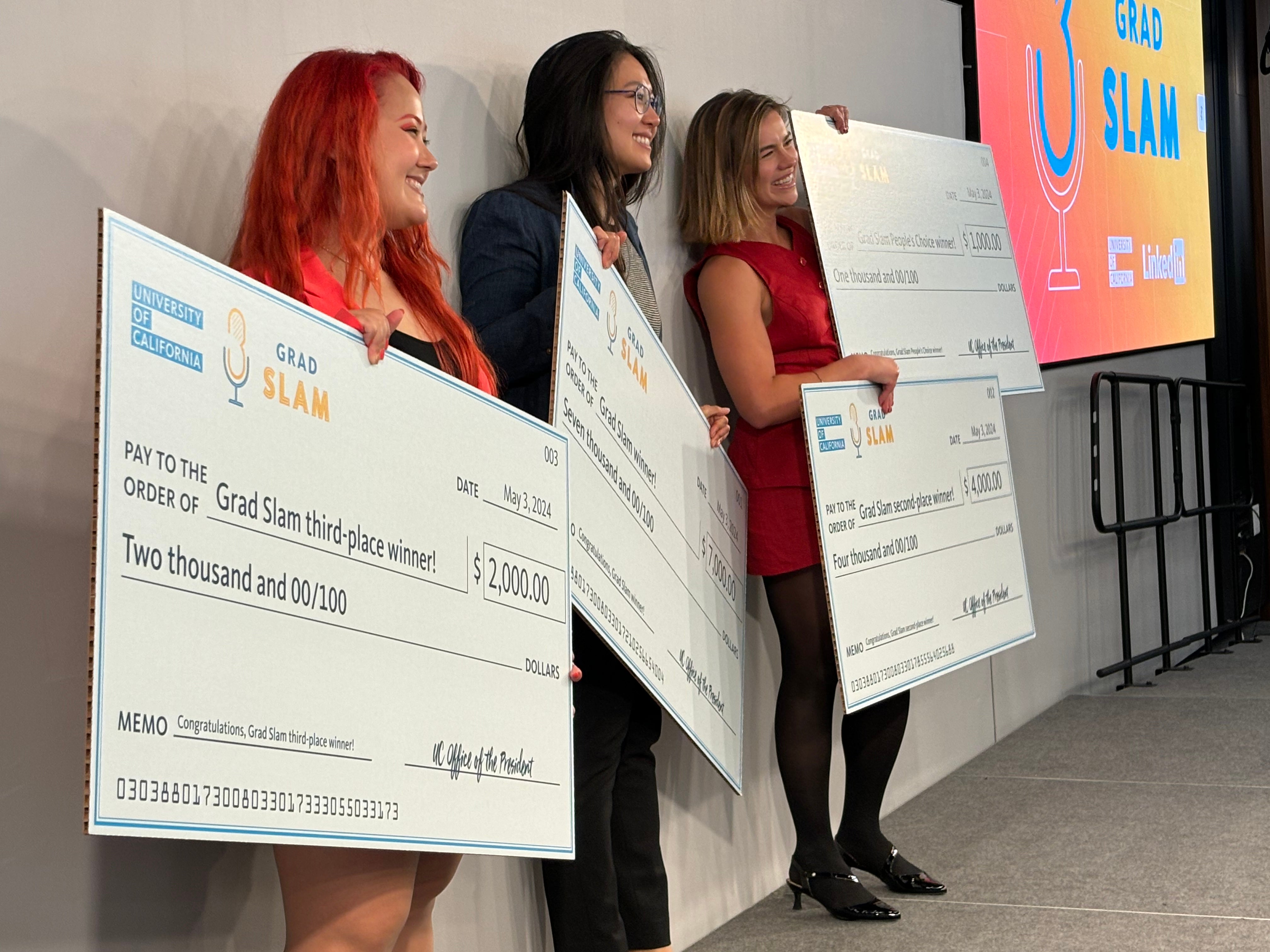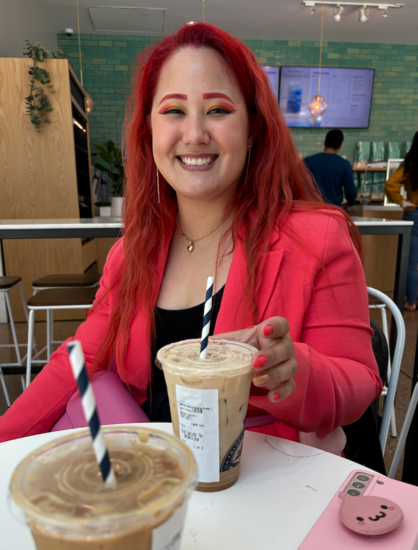
On May 3, UC Riverside doctoral student Shannon Brady competed in the 2024 UC Grad Slam, a system-wide contest that challenges graduate students to showcase their research in engaging presentations of three minutes or less.
Out of 10 presentations, Brady’s psychology research “Thinking out Loud: Is Self-talk a Secret to Success?” took third place, winning her a $2,000 student support award. First place went to Iris Garcia-Pak of UC San Diego and second place/Audience Choice to Kacie Ring of UC Santa Barbara.
The UC-wide event took place in San Francisco at the LinkedIn HQ.
Brady was selected to move on to the final after winning the grand prize at the 2024 UCR Grad Slam finals on May 8, where she competed against eight of her campus peers. She won $5,000 at the UCR competition.
“I'm truly amazed,” Brady said. “I still can't believe this happened. But I'm so glad it did because at the end of the day I love to talk to people and I love to talk about psychology, and Grad Slam has provided me the best platform to do that.”
Brady is expected to graduate from UCR’s developmental psychology Ph.D. program in 2025.
Watch the entire 2024 UC Grad Slam recording, watch Shannon's presentation, read more about the presenters, research topics, and judges, or read UCOP's article about the competition.
Shannon Brady shares her Grad Slam experience
Q: Why did you choose to research “Thinking out Loud: Is Self-talk a Secret to Success?”
A: During the COVID-19 pandemic, I realized just how much I was talking out loud to myself and it made me wonder, ‘Why am I doing this? Do other people do this?’ Turns out, YES. People use self-talk very often and it’s quite normal. Children naturally begin using it early on in life and it helps scaffold their thoughts, actions, and behavior. Though most of the self-talk literature is about children (fortunately, my field of study), there has been less empirical investigation of why/how self-talk may become internalized around school age and whether/how self-talk might support emotional processes. So, my dissertation aims to begin disentangling these open questions.
Q: After the UCR win, how did you prepare for the UC competition?
A: I tried very hard not to OVER prepare, and fortunately I had a lot of other things going on, so I didn’t have too much time to get stuck in my head about it. Fortunately, Academic Preparation, Recruitment and Outreach Office, or APRO, staff like Laura McGeehan and Karla Bonilla were extremely supportive and made themselves available to help me practice in between the busy times. In addition, I’ve been very lucky to have the support of Dr. Annika Speer, a professor of teaching in UCR’s Department of Theatre, Film, and Digital Production, who is the co-director of the UC-wide public speaking initiative. Annika and Laura played a huge role in helping me feel confident in my talk as they helped me condense information, gave me advice on how to streamline verbal content, and even provided (much needed) feedback about my physicality/gestures/movement!
Q: Who from campus and from your network traveled to San Francisco with you?
A: My advisor, Liz Davis, woke up at 3 a.m. to fly out of LAX and support me that day, which meant a lot. In addition, Dr. Lidia Kos (vice provost & dean of Graduate Studies) and Laura McGeehan (director of APRO were there as well. Though I couldn’t have my full complement of supporters present in person, it meant SO MUCH to have those three friendly faces there to help anchor myself. And a huge shout-out to everyone who was supporting me online.
Q: What were the similarities/differences between the UCR and UC competitions?
A: One of the most salient differences I noticed was my nerves. Not to say that I didn't feel anxious, but once the UC event started, I felt like I breached the event horizon of my nervousness and my body calmed down. Unlike the UCR finals where my heart was beating out of my chest and my legs felt like Jello, this time I felt like my brain went empty. That sounds bad, but I think it was a good thing, because being empty means there’s no thoughts to worry about. Once I got on stage, the autopilot kicked in and I did exactly as I practiced! The only way I knew my body might still have been nervous was when I held up my hands in a shrug and I could see they were shaking. I love seeing development and change in real time, and this experience provided extra impetus for me to continue practicing my public speaking skills in the hope that, one day, I will have fully overcome the nerves!
Q: What is your biggest takeaway from this experience?
A: I think the impact I feel I had on the audience. Just an hour after the talks ended, there was a slight hiccup in the announcement of awards and while they cleared things up, someone yelled out, “EVERYONE TALK TO YOURSELVES!!!”
Q: Any advice to future UCR Grad Slammers?
A: I 11/10 recommend this to any graduate student — no matter where they are in their graduate career or public speaking journey. Regardless of how far one gets, the workshops that are available to students present amazing learning opportunities and ways to grow your repertoire of skills. It’s also a great way to make connections with graduate students from other parts of campus (which I rarely get to do) and learn about the wide array of cool work that’s being done on campus.
Q: What are the plans for your last year at UCR?
A: I’ll be conducting my dissertation. If you know any local children between ages 5-9, send them my way! I’ll also be looking for job positions. If you know anyone looking for a post-doc in emotions research, ALSO send them my way.
